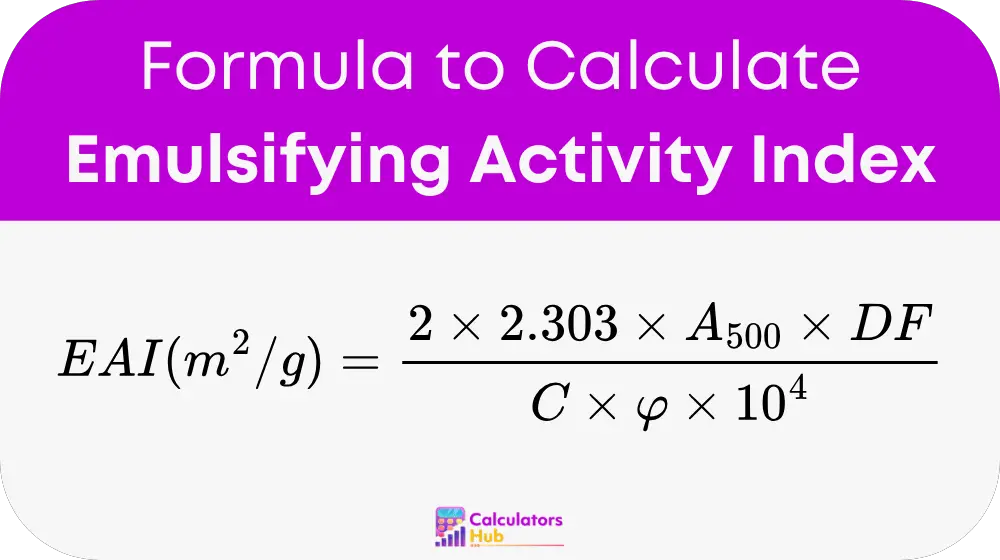Un espacio para hacer una pausa, reflexionar y reconectarse en privado. Emulsifying Activity Index (EAI) Calculator measures how well a substance—usually a protein—can form and stabilize emulsions. Scientists use this tool in food technology, pharmaceuticals, and cosmetics to compare ingredients and understand which ones perform better in creating stable emulsions.
This calculator helps you convert lab data into meaningful surface area values (m²/g), showing how efficiently a protein spreads oil droplets in water. A higher EAI means the emulsifier works more effectively.
Formula of Emulsifying Activity Index Calculator

Desglose detallado
- A₅₀₀ – Absorbance of the diluted emulsión measured at 500 nm using a spectrophotometer
- DF – Factor de dilución applied before measuring the absorbance
- C – Protein concentration in the water phase (in grams per milliliter, g/mL)
- φ – Volume fraction of oil in the emulsion
- 2.303 – A constant to convert absorbance into optical densidad
- 10⁴ - Un conversión de unidades factor to express the result in square meters per gram (m²/g)
This formula helps researchers standardize emulsifying capacity, making it easier to compare different samples.
Términos generales y tabla de referencia
| Término | Descripción |
|---|---|
| Emulsión | A stable mixture of oil and water |
| Y AHÍ | Emulsifying Activity Index (m²/g) |
| A₅₀₀ | Absorbance at 500 nanometers |
| Factor de dilución (DF) | The factor by which the sample is diluted before measurement |
| Protein Concentration (C) | The amount of protein in the solution (g/mL) |
| Volume Fraction (φ) | The ratio of oil volume to total emulsion volume |
Example of Emulsifying Activity Index Calculator
Suponga que tiene:
- A₅₀₀ = 0.8
- DF = 10
- C = 0.02 g/mL
- φ = 0.25
Ahora aplica la fórmula:
EAI = (2 × 2.303 × 0.8 × 10) / (0.02 × 0.25 × 10⁴)
EAI = (36.848) / (50) = 0.737 m²/g
This means the sample provides 0.737 square meters of emulsified surface per gram of protein.
Preguntas frecuentes más comunes
Higher EAI values (above 1.0 m²/g) often indicate better emulsifying properties.
EAI mainly applies to proteins, but you can adapt the method for other emulsifiers if needed.
This wavelength offers consistent readings for turbid emulsions and is standard in emulsifying studies.